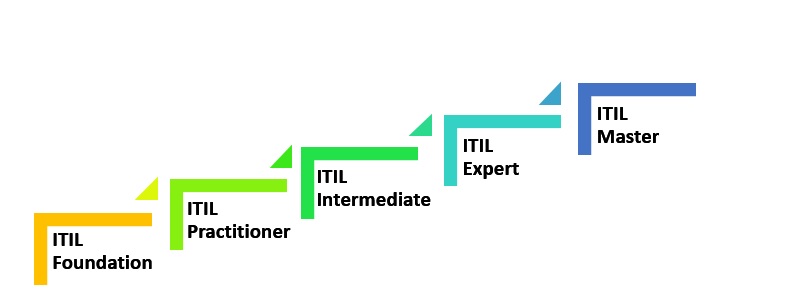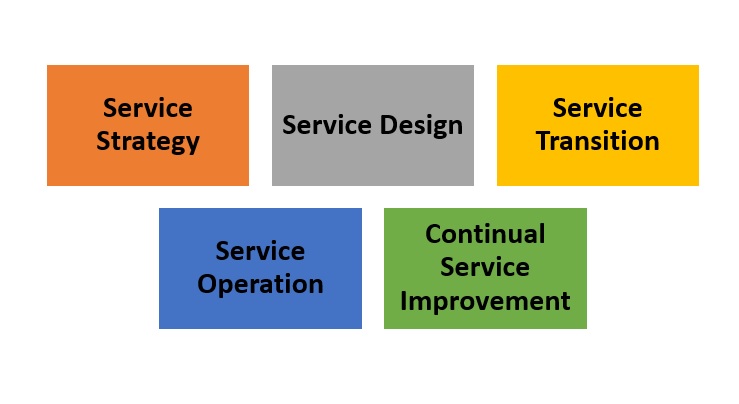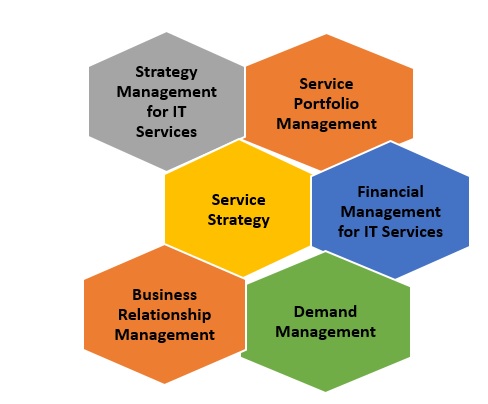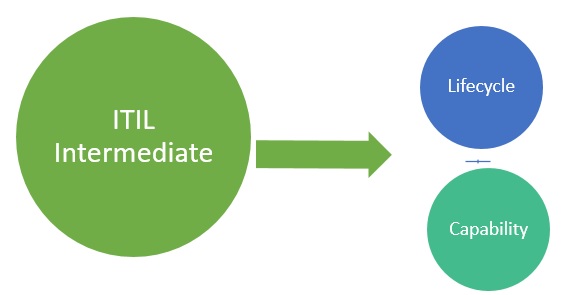Have you heard this new mantra ITIL and ITIL course being chanted by many? Are you wondering what this ITIL course is and why it is so much sought after? We will explain in this post what ITIL course is and why you should go for it!
Hint: Please check our “How can I Pass the ITIL Exam in 1st Attempt” post after this one as well. Click on link and it will open in a new tab so you won’t lose this page 😉
What is ITIL?
What is ITIL and what does ITIL stand for? Information Technology Infrastructure Library or more commonly referred to as ITIL comprises of the practices need to for IT Service Management or ITSM. Now, your next question- what is IT service management and what is its role in ITIL course?
When did ITIL start?
By the way, did you know that originally in the 1980s when UK government wanted to streamline the IT practices, ITIL came up? Are you wondering about the word library? Well, initially it was a set of book that dealt with each practice in the IT Service Management and therefore the name library! Therefore, in ITIL course you would understand all about the various ITSM practices too.
What is ITSM?
Information Technology has become the backbone of any business. Therefore, any lapses or issues in the IT service delivery and management could cripple a business. Hence, it is imperative that there are well-defined policies, procedures, and processes to ensure the effective IT Service management. Thereby, implying that ITIL framework deals with the effective practices needed for defining, creating, delivering, managing and controlling the Information technology services provided to customers
How is ITIL structured?
The foundation for ITIL is a continuous improvement or the PDCA cycle. PDCA stands for Plan, Do, Check, Act which is a simple way to say raise the bar every time and keep going to the next level. ITIL is also to some extent aligned to the ISO/IEC 20000- International Service Management Standard for IT service management from the International Organization for Standardization (ISO). Hence for the ITIL, concepts & principles from an international standard are also incorporated which are reflected in the ITIL.
Is ITIL specific to UK and Government projects?
Though it originated in the UK, it is not specific to any country or sector or industry. It is industry or company independent and can be applied across industries.
ITIL is a framework of the best practices needed across the Information Technology Service Life Cycle. ITIL enables an organization to fortify its strategy by using the processes, procedures, tasks, and checklists in ITIL and showcase its level of competence and a baseline for continuous improvement.

Why ITIL course?
ITIL Certification training or ITIL course gives you knowledge about the IT infrastructure and service management. ITSM has become an essential part of any business. Moreover, there are many companies who provide these services as their main line of business. Hence, it is essential to have an understanding about the ITIL if you are working in the IT Service providing company or using the services. Either way by taking up the ITIL course, you will know about the service management processes.
How does ITIL course help?
ITIL framework ensures that there are a consistency and predictability in the service delivery across various units, organizations, and processes. These are a compilation of the best practices and hence there is no compulsion as to what and how much to adopt. Therefore, organizations can decide how to tailor to their needs.
ITIL helps an organization to have:
- Predictable service level
- Improve efficiency
- Consistency in processes
- Better risk management
- Effective change management
What are the ITIL certifications available?
These are the ITIL courses that are available for each certification in the ITIL lifecycle that you can plan for. These are progressively higher level courses and certification that show your increasing level of competency. ITIL course help you understand the ITIL framework while helping you in your preparation for ITIL certification.
5 Benefits of ITIL
Though there are many benefits of an ITIL course and the different certifications, let us look at the top 5 benefits.
- Better equipped: When you undergo the ITIL course, you have more insight into the ITIL framework and hence you can manage the work better. Moreover, you will be able to appreciate the need and application of the processes, activities in ITIL. Therefore, you will be able to work more efficiently and be a higher productive resource.
- Better Pay: After you have attended the ITIL course, If you have completed the certification too, you have better job prospects. Compared to other non-certified candidates, you have an edge in the ITSM sphere. Moreover, as a certified ITIL professional, your pay scale also gets a substantial jump. The average salary for ITIL certified professional can increase by more than 15%. Average salary per annum could be around $100,000 once you are certified. Though the salaries could vary based on the location and experience, there is a definite increment in your salary after the ITIL course leading to certification
- Recognition of expertise: With the ITIL course and certification under your belt, you are recognized for the expertise and skills in managing the services in your organization. Both your senior leadership in the organization and your colleagues would appreciate your ability to manage the services and processes effectively.
- Common terminology: Since ITIL course gives an insight into the ITIL framework, you could get to know the terminology that is common across industries and countries. Therefore, you speak a common language with a variety of customers.
- Holistic view: With the ITIL course, you get to know the fitment of business with IT service and infrastructure. Therefore, you get to understand the big picture and hence make a valuable contribution to the organization which in turn makes you a much sought after employee in the company.

What are the ITIL certification levels?
Do you want to show your mettle in ITSM and ITIL? Then the certification is a great way – they do the talking for you. ITIL certifications are internationally recognized and in great demand. If you are planning a career in IT infrastructure management, Data Center operations, etc., this is a must have certification. Therefore, ITIL course is an essential tool for you to get your certification. For some companies, ITIL certification is mandatory if you are looking to work in IT infrastructure management arena.
Here are the ITIL certification levels and relevant ITIL course you can aspire for:

Let us look at each ITIL course and the requirements for the certification:
ITIL Foundation
This ITIL certification is a mark that you are aware of the basics of ITIL, ITSM life cycle. ITIL course or ITIL foundation training will give you an insight into the ITIL ITSM Life Cycle, process improvement and the benefits of using ITIL framework from this ITIL course. Typically, the ITIL course at the Foundation level will discuss the 5 stages/ core areas:
 Service Strategy: As the name suggests, you will be able to learn how the IT service processes should align and integrate with the organization strategy to produce the desired business benefits to the customers. ITIL course does not define which strategy to use but recommends how Information Technology supports the organization strategy to achieve the organizational objectives. Focus is on the business benefits, the Return on Investment and efficiency improvement. ITIL Service Strategy includes the following components: Portfolio management, Financial Management, Demand Management, Business Relationship Management and Strategy Management for IT Services. ITIL course would help you understand these components and how they fit in the Service Strategy.
Service Strategy: As the name suggests, you will be able to learn how the IT service processes should align and integrate with the organization strategy to produce the desired business benefits to the customers. ITIL course does not define which strategy to use but recommends how Information Technology supports the organization strategy to achieve the organizational objectives. Focus is on the business benefits, the Return on Investment and efficiency improvement. ITIL Service Strategy includes the following components: Portfolio management, Financial Management, Demand Management, Business Relationship Management and Strategy Management for IT Services. ITIL course would help you understand these components and how they fit in the Service Strategy.
 Service Design: ITIL course covers the next core area of ITIL framework which is the service design. This component of ITIL course would give inputs on how you vision a service. The blue print of coming up with a solution for the service and managing the service through the management information systems. In addition to this, ITIL service design would also describe the technology, processes, and measurements to ensure it is effective which you can learn from the ITIL course
Service Design: ITIL course covers the next core area of ITIL framework which is the service design. This component of ITIL course would give inputs on how you vision a service. The blue print of coming up with a solution for the service and managing the service through the management information systems. In addition to this, ITIL service design would also describe the technology, processes, and measurements to ensure it is effective which you can learn from the ITIL course
Service Transition: The next part of the ITIL life cycle is the ITIL service transition. When we say life cycle, there are services that change or have become obsolete and hence removed. How to take care of this change? Managing changes in the services is explored under this core area in the ITIL course. You would be able to apply change management and risk management to ensure a smooth transition of new and modified services in the ITIL framework by going through this course.
Service Operation: ITIL Service Operation is the core area which takes care of the everyday activities, processes and other infrastructure requirements that ensure that Business runs smoothly and gives the desired value to their customers. These are akin to the well-oiled gears that run the whole machinery of business. Therefore, you need to understand the consumerization of services and its guarantee through Service Level Agreements (SLA) in the ITIL course.
Continual Service Improvement: We have already seen that the foundation or base for ITIL is the PDCA Hence, you cannot complete an ITIL course without understanding the Continual Service Improvement (CSI). What you cannot measure, you cannot control! This is what is built into the CSI. You will be understanding the metrics needed to measure and improve the processes in the ITIL framework in this module of the ITIL course. In addition to this, the ITIL course would also discuss the Critical Success Factors (CSF) and the Key Performance Indicators (KPI) that drive it.
ITIL Practitioner
When you complete the ITIL course at Foundation level, you would have an understanding of the basics of the ITIL framework and how the different stages of life cycle work. By completing the ITIL course at Practitioner level, you would be equipped with knowledge on the application of the framework.
ITIL Intermediate
Now that you have equipped with the ITIL course on the fundamentals, you can start looking for specialization. Which area interests you? Would you want to take the Lifecycle stream or the Capabilities stream?

Life cycle path:
Are you managing the complete IT Service Management and are responsible for the overall service management? Then, the lifecycle stream helps you understand the synergy needed between the IT Infrastructure, service management, and the Business strategy. You would get a broad picture of the alignment of organization strategy with ITSM through this ITIL course at Intermediate level.
You can choose one or more options available under the Intermediate in this ITIL course. What options do you have? As already discussed, there are 5 streams in ITSM lifecycle. You can choose from the following: ITIL Intermediate Service Strategy/Design/Transition/Operation/Continual Improvement
Capabilities path:
You may be the person who is actually working on the various processes and activities. In that case, do you want to know how best to execute them, the best practices, measurement, metrics, etc.? Then, this is the path for you to learn about developing and improving the best practices for various processes in the ITIL course at Intermediate level. What can you choose from? Operational Support & Analysis, Intermediate Planning, Protection & Optimization, Intermediate Release, Control & Validation, Intermediate Service Offerings, and Agreements.
ITIL Expert
Demonstrate your expertise in the total ITIL framework and then you become an Expert. ITIL Expert course puts you on a pedestal in the IT service management field. But, if you want that coveted position and title, you should have completed the ITIL course dealing with Foundation, Practitioner, and Intermediate levels. Moreover, in these modules of ITIL course put together, you should have earned 17 credits. This is a minimum prerequisite for appearing for ITIL Expert. Along with this, you need to earn 22 credits in the Managing Across the Lifecycle (MALC) module.
ITIL Master
Do you want to reach the pinnacle of ITIL framework? The zenith is the ITIL Master level which showcases your prowess and mastery over ITIL because of which you are now the ITIL Master. Therefore, this ITIL course and certification is the ultimate in ITIL which you can aspire for.
Prerequisites for ITIL Master: Complete the ITIL course and get certified as ITIL expert. If you are through this, another criterion is your experience. Did you work for a minimum of 5 years in a leadership role in ITSM? If you meet these two requirements, you can appear for ITIL Master.

How to choose an ITIL course?
Now that you have seen the various ITIL certification, you can decide which ITIL course to go for. How do you choose the ITIL course that is right for you? Here are a few points to consider when deciding the ITIL course:
- What is the type of course? Classroom or online ITIL course?
- How much experience does the instructor have?
- What material will the ITIL training provider give you to prepare for the ITIL certification?
- Do they also give some guarantees on the ITIL certification exam that you plan to take?
Let us explore the advantages and disadvantages of both modes of ITIL course: Classroom and ITIL certification online.
Classroom ITIL course
This is the traditional mode of learning about the ITIL framework and acquainting yourself with the certification exam.
Who should go for the ITIL course delivered by class room mode? Are you comfortable with the conventional instructor and class with peers to discuss and debate on the various topics? Can you focus only if you have an instructor physically present and the ambiance of class room? Then, this is definitely what you should opt for.
Advantages:
- You can finish at a stretch the course over a weekend
- There may be knowledge sharing in the company of other participants
- An instructor and physical class room may give you seriousness and help stay focused (provided you have a good instructor)
Disadvantages:
- Could be difficult for you to spare a complete weekend
- Generally, the batch is pre-determined and it has to be booked in advance which could be difficult if you are working in high-pressure environment or you have shift rotation in your work
- The pace at which you learn may not match with others, you are faster on some topics and slower in a few others. Could lead to a disconnect
Online ITIL Course
Online ITIL Course is the virtual online ITIL training mode of learning that has recorded sessions. This has all the advantages of the class room session except that it is virtual. You get access to the session for a specific time period within which you can complete the course. Some providers give you downloadable material such as Study Guide, handouts and also access to practice tests. You can get a feel of the real exam by working on these practice and mock exams.
Let us understand the advantages that the online ITIL course has along with the disadvantages
Advantages:
- You can access the course from anywhere and anytime as long as you are connected to the internet
- Do it at your pace! Some days you are at your peak focus, hence you can complete major chunk and every concept is internalized. While a few days are not yours and you may be doing at a snail’s pace. Don’t worry, no one to rush you.
- Another plus is you can revise those core areas that you are not comfortable yet since the total course is available at your command.
- Some providers give you multiple subscription options wherein you can pick a monthly/yearly or a life time
Disadvantages:
- You do not have peers when attending though there are blogs provided by a few training providers to share information
- Lack of physical class room or an instructor
We have seen the different ITIL course options and levels that you have. Therefore, based on what stage you are at choose the ITIL course that fits your requirement. Also, look at the pros and cons of courses and make an informed decision to add the right zing to your career growth.
Author Biography:

Sunanda Gundavajhala, B.Tech, M.B.A, PMP has over 25 years of project management. She is a consultant, trainer on project management for different sectors and is the recipient of “Recognition of Excellence” award from PMI, USA and Woman Volunteer award from Hyderabad, India Chapter of PMI. She has contributed to the “Practice Standard on Scheduling, PMI”. She has worked as the Liaison officer for PMIEF (Education Foundation) for the Hyderabad, India Chapter of PMI.


One thought on “ITIL Course – 5 Major Benefits of ITIL Course & ITIL Certification”
Comments are closed.